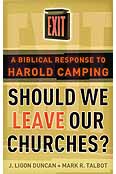
J. Ligon Duncan and Mark R. Talbot
Reviewed by: William Shishko
Should We Leave Our Churches? A Biblical Response to Harold Camping, by J. Ligon Duncan and Mark R. Talbot. Published by P&R Publishing, 2004. Paperback, 59 pages. list price $4.99. Reviewed by OP pastor William Shishko, who quotes the NASB.
The historic Christian faith has maintained that outside of the visible church "there is no ordinary possibility of salvation" (Westminster Confession, XXV:2). Those who are being saved are added to the church (Acts 2:47). Christ promises his presence with his church until the end of the age (Matt. 28:18-20; 18:15-20). We grow to maturity in the context of church life because the very glory of God is pledged to the church "to all generations forever and ever" (Eph. 3:21). In his Institutes of the Christian Religion, John Calvin speaks of the visible church as the "mother of believers" (cf. Gal. 4:26), and warns: "It is always disastrous to leave the church" (4.1.4).
But now, against this biblical and historical background, along comes Mr. Harold Camping, cofounder and president of Family Radio Network, to announce "the end of the church age," both in writing and via his string of radio stations. The readers of his book, The End of the Church Age . . . and After, are told, among other amazing things, that "there is no hope of any kind for the local churches. We are not even to pray for them" (p. 197). Supposedly, "God has commanded that the believers must depart out of their churches" (p. 210).
One would think that such a brazen denial of biblical teaching would be universally rejected as poppycock. However, in our age of unbridled individualism, which already has a low view of the church, such teaching has appealed to many of Harold Camping's followers. In obedience to Mr. Camping, who audaciously asserts that there is "not to be a debate concerning God's command" to leave the church (pp. 241-42), they now "fellowship outside of the church with individuals of like mind" (p. 260), while remaining aloof from any established Christian church.
Thankfully, Dr. J. Ligon Duncan, senior minister of First Presbyterian Church (PCA) in Jackson, Mississippi, and Dr. Mark R. Talbot, associate professor of philosophy at Wheaton College, have teamed up to produce a brief, but rich, response to Mr. Camping's atrocious teachings. After summarizing his claims, the authors succinctly list the various errors and issues and then offer biblical replies. This provides an excellent primer on the biblical doctrine of the church. It offers individuals and churches material to help inoculate Christians against antichurch mentalities that go well beyond Harold Camping. Even if readers have no interest in Camping's teachings, this clearly written distillation of the doctrine of the church makes the booklet especially valuable.
For a more in-depth evaluation of Harold Camping and his errors, one will want to read James White's Dangerous Airwaves (Calvary Press, Amityville, N.Y.). However, Should We Leave Our Churches? is excellent for more general reading.
Harold Camping ought not to be regarded as a Christian, let alone a credible Bible teacher. Churches on every level have called him to repentance for his heretical teachings, but he has not listened. One should read Matthew 18:17 and, with grief, draw the necessary conclusion. I urge you to use this book to help deliver people who are under the influence of one who has risen up from "among (us) . . . speaking perverse things, to draw away the disciples after (him)" (Acts 20:30).
Editor's note: The Seventy-first General Assembly passed a resolution commending the Presbytery of Northern California for condemning Mr. Harold Camping's unscriptural doctrine of the church.
March 30, 2025
On the Trail with a Missionary
March 23, 2025
Midnight Mercies: Walking with God Through Depression in Motherhood
March 16, 2025
March 09, 2025
Zwingli the Pastor: A Life in Conflict
March 02, 2025
February 23, 2025
African Heroes: Discovering Our Christian Heritage
February 16, 2025
© 2025 The Orthodox Presbyterian Church